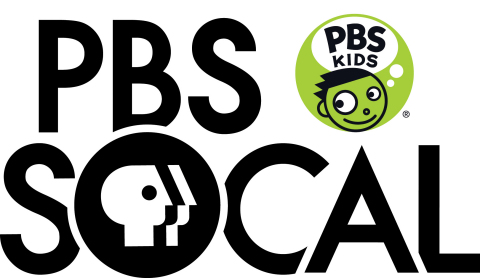LOS ANGELES--(BUSINESS WIRE)--PBS SoCal KOCE, home for PBS to Greater Los Angeles and Southern California, announced the launch of PBS SoCal KIDS – a new, free 24/7 channel and streaming service dedicated to award-winning educational PBS KIDS programs all day, every day. This is an expansion of PBS SoCal’s robust early childhood education services whose goal is to help close the achievement gap for the more than 1 million children under the age of five living in Southern California, one in five of which lives in poverty.1
PBS SoCal KIDS makes it easy for Southern California children to access educational PBS KIDS programs that have been proven time and time again to teach children, through a tested curriculum in literacy, STEM and social-emotional development. Now this valuable educational content is available to all Southern California children anytime – during dinner-prep and primetime hours, and on the weekends – when TV viewing is the highest amongst families. And it is available anywhere kids want to watch – over the air, online, and on their favorite mobile device.
“Well developed educational media can have immense impact on a child’s cognitive and emotional skills. This is a great strength of PBS KIDS content. That is why it’s our priority to expand our early learning work in Southern California through PBS SoCal KIDS,” said Andrew Russell, PBS SoCal President and CEO. “Our community’s success in early learning defines our future for Southern California. Today’s preschoolers are tomorrow’s workforce and leaders, so we are deeply committed to ensuring they are prepared for school and life.”
The ages of 2-8 are a critical time in the brain development of children, as these are years when they are forming cognitive capacities necessary to succeed in school and life. Research has consistently shown that quality early education can have life-long benefits.2 But in Southern California more than 40 percent of children ages 3-5 are not enrolled in preschool.3 In this environment, the PBS SoCal KIDS service is particularly valuable, reaching more Southern California children in more ways, and at a critical time in their development.
“We know PBS KIDS content teaches kids. We also know we can amplify its impact with our Ready to Learn initiative, through which we bring literacy and STEM activities, free apps, teacher training, parent workshops and more to neighborhoods all over Southern California,” said Jamie Myers, PBS SoCal COO and VP of Education & Community Engagement. “Our dozens of community partnerships are critical in this effort, and have enabled us to help thousands of children across Southern California prepare for school.”
Broad access to this new service is especially important for young children living in working-class households, who are more likely to rely on television for educational content, and more likely to be under-connected, with mobile-only access and inconsistent connectivity to the internet. That’s why the new PBS SoCal KIDS service is available for free over the air (channel 50.5), and via live stream at pbssocal.org and on the PBS KIDS iOS and Android apps. Additionally, PBS SoCal will expand its educational efforts in the community, working with community partners like PACE and the Compton Unified School District to provide educational tools and training to parents, caregivers and teachers.
“It has been a pleasure and a wonderful opportunity to partner with PBS SoCal to help prepare our scholars for academic success,” said Jessicka Mears, Principal of Stephen C. Foster Elementary School in Compton. “Over the years they have provided teacher professional development, parent workshops, interactive hands-on experiences, and educational resources for our students. Their efforts have had enormous impact on closing the academic achievement gap and setting the tone for 21st century learning. It is clear they have a deep commitment to helping our community succeed.”
A recent survey by WestEd found that PBS KIDS resources can help narrow the math achievement gap for children from low-income families and better prepare them for kindergarten.4 That is because PBS KIDS content is educational by design – developed based upon curriculum that teaches kids.
Additionally, new recommendations about media use by children from The American Academy of Pediatrics, which place greater emphasis on the quality of the media kids interact with, rather than the quantity, pointed to PBS KIDS as a leading resource for educational programming.
PBS SoCal KIDS is located over-the-air on channel 50.5 (check channel listings) and available to stream at pbssocal.org/kids – reaching children on a platform at a time that works for them. This programming will air in addition to the regularly scheduled KIDS block on PBS SoCal 1 (ch. 50.1) and carry a different program line-up, offering families a variety of options. The new channel will include popular favorites such as Daniel Tiger's Neighborhood, Odd Squad, Wild Kratts, and Dinosaur Train; in addition to PBS KIDS’ newest series Splash and Bubbles, Nature Cat and Ready Jet Go!. The full local schedule is available at pbssocal.org/kids.
About PBS SoCal KOCE
PBS SoCal is the home to PBS for Greater Los Angeles and Southern California. We deliver the full schedule of PBS programs, plus content that is for, about and by the people of Southern California. Our content is available free through four broadcast channels, at pbssocal.org, on PBS mobile apps, and via connected TV services. And we provide the community with early education resources and cultural and educational experiences through partnerships, events and grassroots outreach. PBS SoCal has offices in Century City, Costa Mesa, and Los Angeles. Connect with us at pbssocal.org and on Facebook, Twitter, Instagram and Snapchat.
1 U.S. Census Bureau, 2015 American Community Survey 1-Year Estimates
2 Center for Public Education. (2008). The Research on Pre-K.
3 kidsdata.org, Population Reference Bureau, analysis of data from the U.S. Census Bureau's American Community Survey microdata files (Mar. 2016)
4 Learning with PBS KIDS: A Study of Family Engagement and Early Mathematics Achievement, WestEd, 2015.




